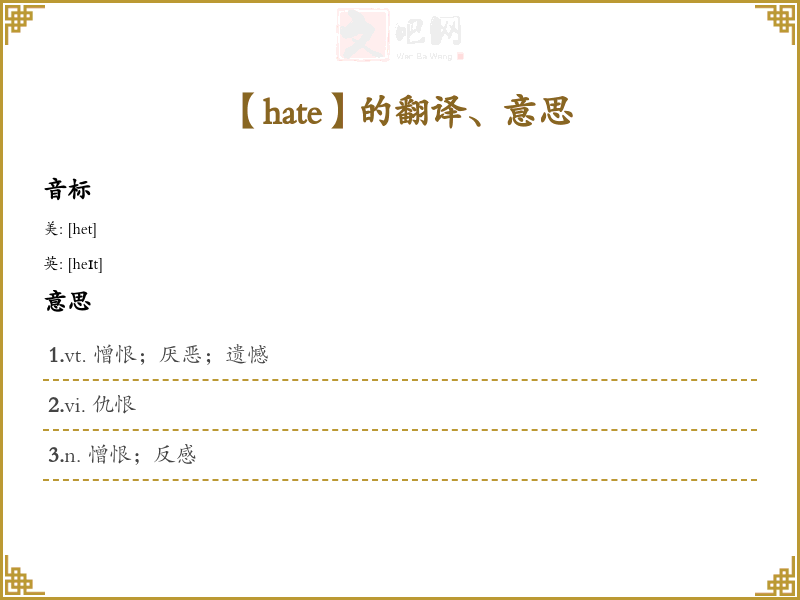【hate】的翻译、意思
时间: 2025-04-24 02:15:50
【hate】怎么读
美:[het]
英:[heɪt]
【hate】是什么意思、字义解释
1. vt. 憎恨;厌恶;遗憾
2. vi. 仇恨
3. n. 憎恨;反感
4. n. (Hate)人名;(法)阿特
【hate】的详细解释
1. 基本定义
-
字面意思:
"Hate" 是一个表示强烈反感或厌恶的情感的词。
定义:对某人或某物感到非常不喜欢或厌恶。 -
词性:
动词(verb)、名词(noun)。
2. 词源与起源
-
词源分析:
"Hate" 源自古英语 "hatian",意为“恨”或“憎恨”。它与德意志语的 "hassen" 和古诺尔斯语的 "hata" 有相同的根源,均表示厌恶的情感。 -
历史背景:
"Hate" 在文学作品中有悠久的历史,早在中世纪的文学中就有使用。例如,莎士比亚的作品中多次提到对某人或某事的仇恨。 -
课本:
在**的英语教材中,可能会在初中和高中阶段出现,尤其是在涉及情感和人际关系的单元。在牛津与美国的教材中,通常也在初中和高中英语课程中出现,尤其是在讨论社会问题和情感表达的章节。
3. 使用场景
-
正式与非正式语境:
在正式场合(如演讲或论文中),“hate” 通常与更严肃的话题相关,如社会不公、种族歧视等。例如:“社会上存在的仇恨犯罪需要引起重视。”
在非正式场合,它可以用来表达个人对某事的强烈不满,如:“我真讨厌早起!” -
特殊场合:
在法律领域,“hate” 常用于描述基于种族、性别或性取向的仇恨犯罪。在科学研究中,可能会探讨“hate” 对心理健康的影响。例如:“仇恨情绪的积累可能导致心理问题。”
4. 示例句子
-
I hate waking up early in the morning.
我讨厌早上早起。 -
She felt a deep hate for the injustice she witnessed.
她对她目睹的不公深感厌恶。 -
Hate crimes are a serious issue that society must address.
仇恨犯罪是社会必须面对的严重问题。 -
He expressed his hate for the new policy during the meeting.
他在会议上表达了对新政策的厌恶。 -
Many people hate being judged for their choices.
许多人讨厌因自己的选择而被评判。
*. The movie explores themes of love and hate.
这部电影探讨了爱与恨的主题。
-
Hate often stems from fear and misunderstanding.
仇恨往往源于恐惧和误解。 -
I hate when people are rude to each other.
我讨厌人们彼此无礼。 -
He tried to hide his hate, but it was evident in his tone.
他试图掩饰自己的仇恨,但在他的语气中显而易见。 -
The song captures the essence of love and hate.
这首歌捕捉了爱与恨的本质。
5. 同义词与反义词
-
同义词:
- Abhor(痛恨): 与 "hate" 的意思相近,但通常表示更深层次的厌恶。
- Detest(厌恶): 强烈不喜欢某事或某人。
- Loathe(厌恶): 更加强调一种强烈的厌恶感。
-
反义词:
- Love(爱): 表达对某人或某事的强烈喜爱。
- Adore(崇拜): 表示非常强烈的爱或喜欢,通常带有崇敬的成分。
- Like(喜欢): 一种较轻的、正面的情感。
. 学方法
-
音标记忆法:
通过音标 /heɪt/,可以联想到与“hate”发音相似的单词,如“hate”与“bait”(诱饵)相对立,强调一种消极情感。 -
词根记忆法:
识别词根 "hat"(仇恨),可以联想到与情感相关的词汇,如 "hatred"(仇恨的名词形式)。
7. 关联词汇
- Hate speech(仇恨言论)
- Hate crime(仇恨犯罪)
- Hatred(仇恨的名词形式)
- Self-hate(自我厌恶)
- Hate-filled(充满仇恨的)
通过以上分析,学*者可以更全面地理解和运用“hate”这个单词。
【hate】例句
1、[V-T] If you hate someone or something, you have an extremely strong feeling of dislike for them. 仇恨
-
例:Most people hate him, but they don't dare to say so, because he still rules the country.大部分人都恨他只是不敢说出来,因为他仍统治着国家。
2、[N-UNCOUNT] Hate is also a noun. 仇恨
-
例:I was 17 and filled with a lot of hate.我那时17岁,满腔仇恨。
3、[[no cont]] If you say that you hate something such as a particular activity, you mean that you find it very unpleasant. 讨厌
-
例:Ted hated parties, even gatherings of people he liked individually.特德讨厌聚会,即便是聚会上的每一个人他都喜欢。
-
例:He hates to be interrupted during training.他讨厌训练中被打断。
-
例:He hated coming home to the empty house.他讨厌回到空无一人的家里。
4、[[礼貌]] You can use hate in expressions such as "I hate to trouble you" or "I hate to bother you" when you are apologizing to someone for interrupting them or asking them to do something. 不想
-
例:I hate to rush you but I have another appointment later on.我真不想催你,但我稍后还有一个约会。
5、[[情感]] You can use hate in expressions such as "I hate to say it" or "I hate to tell you" when you want to express regret about what you are about to say, because you think it is unpleasant or should not be the case. 遗憾
-
例:I hate to tell you this, but tomorrow's your last day.我对告诉你这个很遗憾,但明天是你最后一天了。
6、[[强调]] You can use hate in expressions such as "I hate to see" or "I hate to think" when you are emphasizing that you find a situation or an idea unpleasant. 不愿
-
例:I just hate to see you doing this to yourself.我只是不愿看到你这样对待自己。
7、[[no cont]] You can use hate in expressions such as "I'd hate to think" when you hope that something is not true or that something will not happen. 不希望
-
例:I'd hate to think my job would not be secure if I left it temporarily.我不希望一旦我暂时离开,这份工作就不保。
